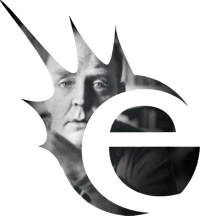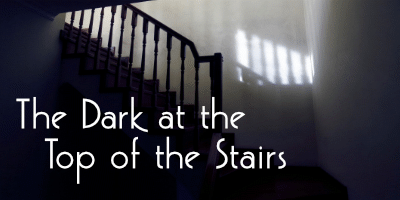

William Inge was born in Independence, Kansas on May 3, 1913, the youngest of five children. His father was a traveling salesman and he had a close relationship with his mother. The small town of Independence had a profound influence on the young Inge and he would later attribute his understanding of human behavior to growing up in this small town environment. "I've often wondered how people raised in our great cities ever develop any knowledge of humankind. People who grow up in small towns get to know each other so much more closely than they do in cities," said Inge.
In 1935, Inge graduated from the University of Kansas at Lawrence with a Bachelor of Arts Degree in Speech and Drama. In 1943, he moved to St. Louis, Missouri, where he worked as the drama and music critic for the St. Louis Times. It was while he worked as a drama critic that Inge became acquainted with Tennessee Williams. He accompanied Williams to a performance of his play THE GLASS MENAGERIE in Chicago. "I was terrifically moved by the play," said Inge. "I thought it was the finest (play) I had seen in many years. I went back to St. Louis and felt, 'Well, I've got to write a play.'" Within three months he had completed FARTHER OFF FROM HEAVEN. Inge then began serious work on turning a fragmentary short story into a one act play, which evolved into COME BACK LITTLE SHEBA, which earned Inge the title of most promising playwright of the 1950 Broadway season.
In 1953, PICNIC won Inge a Pulitzer Prize, The Drama Critic Circle Award, The Outer Circle Award, and The Theatre Club Award. Inge's next success came in 1955 when BUS STOP opened at The Music Box Theatre in New York City. A film version of BUS STOP was released by Fox in 1956 with Marilyn Monroe, Don Murray and Eileen Heckart in starring roles. Inge's fame continued to grow as THE DARK AT THE TOP OF THE STAIRS, a reworking of his first play FARTHER OFF FROM HEAVEN, opened on Broadway in 1957. Considered to be Inge's finest play, it is also regarded to be the one in which he draws most directly from his own past. He confessed the play was his "first cautious attempt to look at the past, with an effort to find order and meaning in experiences that were once too close to be seen clearly."
His next two plays were NATURAL AFFECTION in 1963 and WHERE'S DADDY? in 1965. Both were unsuccessful. In 1968, he resumed his teaching career at the University of California at Irvine but, becoming increasingly depressed, he quit in 1970. During this time he wrote two novels: Good Luck, Miss Wyckoff in 1970 and My Son Is a Splendid Driver in 1971, a largely autobiographical account of Inge's boyhood years.
Inge committed suicide on June 10, 1973 at his home in Hollywood, where he lived with his sister, Helene. He was 60 years old. He was buried in Mt. Hope Cemetery in his hometown of Independence, KS. His headstone reads simply, "Playwright.

April 12 – May 20, 2018
The Athenaeum Theatre
2936 N. Southport Ave. Chicago
Opening Nights April 15 at 3:00 pm, April 17 at 7:30 pm
Runs Thursday, Friday & Saturday at 7:30 pm; Sunday at 2:00 pm
Eclipse opens the 2018 William Inge Season with the rarely staged play, Natural Affection. As she awaits the impending Christmas visit of her teenage son, Donnie, Sue Barker is torn between the love she feels as a mother and the fear that his presence will disrupt the life that she has built in his absence. Having been deserted by the boy's father before his birth, Sue was forced to support herself, leaving Donnie to a childhood of orphan homes and ultimately a term at the penal farm. Working her way up to a position of head lingerie buyer for a Chicago department store, Sue has acquired a small but fashionable apartment and a lover, Bernie Slovenk. When Donnie announces that he will not have to go back to the farm if she will give him a home, the crisis is broached. The inescapable showdown comes on Christmas Eve when the couple from next door joins the others for a party. Rachel Lambert makes her Eclipse directorial debut.

July 12 – August 19, 2018
The Athenaeum Theatre
2936 N. Southport Ave. Chicago
Opening Nights July 15 at 3:00 pm, July 17 at 7:30 pm
Runs Thursday, Friday & Saturday at 7:30 pm; Sunday at 2:00 pm
The 2018 William Inge Season continues with his classic play, Bus Stop. In the middle of a howling snowstorm, a bus out of Kansas City pulls up at a cheerful roadside diner. All roads are blocked, and four or five weary travelers are going to have to hole up until morning. Cherie, a nightclub chanteuse in a sparkling gown and a seedy fur-trimmed jacket, has been pursued and finally kidnapped by a twenty-one-year-old cowboy with a ranch of his own and the romantic methods of an unusually headstrong bull. Meanwhile the proprietor of the cafe and the bus driver at last find time to develop a friendship of their own; a middle-age scholar comes to terms with himself; and a young girl who works in the cafe also gets her first taste of romance. Ensemble member Steve Scott directs.

November 15 – December 16, 2018
The Athenaeum Theatre
2936 N. Southport Ave. Chicago
Opening Nights November 18 at 3:00 pm, November 20 at 7:30 pm
Runs Thursday, Friday & Saturday at 7:30 pm; Saturday & Sunday at 2:00 pm
No Performance Thanksgiving, November 22
The 2018 William Inge Season concludes with the moving family drama, The Dark at the Top of the Stairs. The setting is a small Oklahoma town in the early 1920s and the home of the Flood family. Here we find Rubin, a traveling salesman for a harness firm; Cora, his sensitive and lovely wife; Sonny, their little boy; and Reenie, their teenage daughter. A series of short stories unfolds - the fight between a husband and wife; the fear of an overly shy young girl on going to a dance; the problems of an introverted little boy who feels that the whole world is against him; the corroding marriage of Cora's rowdy sister; and the tragedy of a military school cadet who suffers from the stigma of being a Jew in an alien community. There is dark at the top of everyone's stairs, but it can be dissipated by understanding, tolerance and compassion.
In addition to the three main productions, Eclipse will also explore additional works by William Inge through a year-long free series of intimate readings and discussions, The Playwright Scholar Series. Details are still being planned for all of these special events
Details on the 2018 William Inge Season, including cast and crew for the productions, are still being finalized.